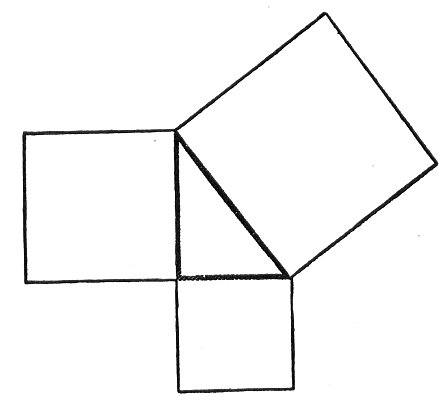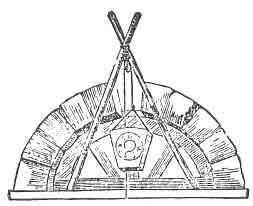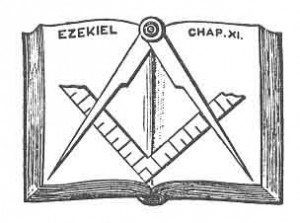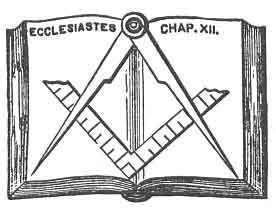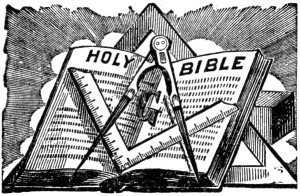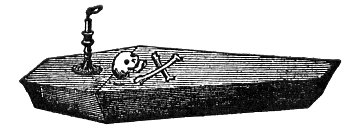There are dangers inseparable from symbolism, which afford an impressive lesson in regard to the similar risks attendant on the use of language. The imagination, called in to assist the reason,
p. 64
usurps its place or leaves its ally helplessly entangled in its web. Names which stand for things are confounded with them; the means are mistaken for the end; the instrument of interpretation for the object; and thus symbols come to usurp an independent character as truths and persons. Though perhaps a necessary path, they were a dangerous one by which to approach the Deity; in which many, says PLUTARCH, “mistaking the sign for the thing signified, fell into a ridiculous superstition; while others, in avoiding one extreme, plunged into the no less hideous gulf of irreligion and impiety.”
It is through the Mysteries, CICERO says, that we have learned the first principles of life; wherefore the term “initiation” is used with good reason; and they not only teach us to live more happily and agreeably, but they soften the pains of death by the hope of a better life hereafter.
The Mysteries were a Sacred Drama, exhibiting some legend significant of nature’s changes, of the visible Universe in which the Divinity is revealed, and whose import was in many respects as open to the Pagan as to the Christian. Nature is the great Teacher of man; for it is the Revelation of God. It neither dogmatizes nor attempts to tyrannize by compelling to a particular creed or special interpretation. It presents its symbols to us, and adds nothing by way of explanation. It is the text without the commentary; and, as we well know, it is chiefly the commentary and gloss that lead to error and heresy and persecution. The earliest instructors of mankind not only adopted the lessons of Nature, but as far as possible adhered to her method of imparting them. In the Mysteries, beyond the current traditions or sacred and enigmatic recitals of the Temples, few explanations were given to the spectators, who were left, as in the school of nature, to make inferences for themselves. No other method could have suited every degree of cultivation and capacity. To employ nature’s universal symbolism instead of the technicalities of language, rewards the humblest inquirer, and discloses its secrets to every one in proportion to his preparatory training and his power to comprehend them. If their philosophical meaning was above the comprehension of some, their moral and political meanings are within the reach of all.
These mystic shows and performances were not the reading of a lecture, but the opening of a problem. Requiring research, they were calculated to arouse the dormant intellect. They implied no
p. 65
hostility to Philosophy, because Philosophy is the great expounder of symbolism; although its ancient interpretations were often ill-founded and incorrect. The alteration from symbol to dogma is fatal to beauty of expression, and leads to intolerance and assumed infallibility.
* * * * * * If, in teaching the great doctrine of the divine nature. of the Soul, and in striving to explain its longings after immortality, and in proving its superiority over the souls of the animals, which have no aspirations Heavenward, the ancients struggled in vain to express the nature of the soul, by comparing it to FIRE and LIGHT, it will be well for us to consider whether, with all our boasted knowledge, we have any better or clearer idea of its nature, and whether we have not despairingly taken refuge in having none at all. And if they erred as to its original place of abode, and understood literally the mode and path of its descent, these were but the accessories of the great Truth, and probably, to the Initiates, mere allegories, designed to make the idea more palpable and impressive to the mind.
They are at least no more fit to be smiled at by the self-conceit of a vain ignorance, the wealth of whose knowledge consists solely in words, than the bosom of Abraham, as a home for the spirits of the just dead; the gulf of actual fire, for the eternal torture of spirits; and the City of the New Jerusalem, with its walls of jasper and its edifices of pure gold like clear glass, its foundations of precious stones, and its gates each of a single pearl. “I knew a man,” says PAUL, “caught up to the third Heaven; . . . . that he was caught up into Paradise, and heard ineffable words, which it is not possible for a man to utter.” And nowhere is the antagonism and conflict between the spirit and body more frequently and forcibly insisted on than in the writings of this apostle, nowhere the Divine nature of the soul more strongly asserted. “With the mind,” he says, “I serve the law of God; but with the flesh the law of sin. . . .As many as are led by the Spirit of God, are the sons of GOD…. The earnest expectation of the created waits for the manifestation of the sons of God. . . . The created shall be delivered from the bondage of corruption, of the flesh liable to decay, into the glorious liberty of the children of God.”
* * * * * * Two forms of government are favorable to the prevalence of

Moe is the founder of GnosticWarrior.com. He is a father, husband, author, martial arts black belt, and an expert in Gnosticism, the occult, and esotericism.

